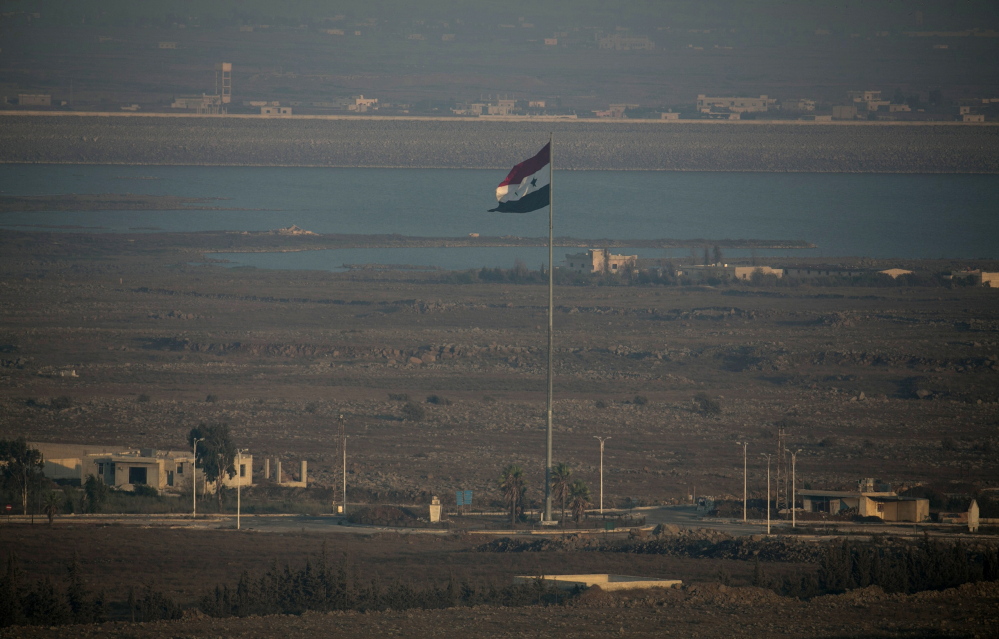EIN ZIVAN, Golan Heights — The green and white flag fluttering above a border checkpoint not far from the Ein Zivan kibbutz on a recent afternoon symbolized the new reality that has taken hold for Israelis who live on the Golan Heights: Islamist rebels now control areas of Syria on the very doorstep of Israeli-controlled land.
For now, the groups, which include al-Qaida’s Nusra Front, are focused on consolidating their positions and pushing toward the Syrian capital, Damascus. But there are worries in Israel that once the Islamist militants establish control, they will turn their guns toward the Israeli-held sector of the Golan.
“Right now it’s not on their agenda, but it’s inevitable,” said Eyal Zisser, an expert on Syria at Tel Aviv University.
Just how big a threat the rebels fighting to topple Syrian President Bashar Assad are to Israel remains an open topic. Israel has tried to remain aloof from the war in Syria, except to blast Syrian government convoys from the air that Israeli officials feared were transferring sophisticated weapons to Hezbollah, Israel’s Lebanese nemesis. Israel’s reaction even to the beheading by the Islamic State of American journalist Steven Sotloff, who held Israeli citizenship, was muted.
But with the capture Aug. 27 of the Syrian side of the Quneitra border crossing, Islamist rebels now occupy land adjacent to the Israeli section of the strategic plateau, changing the calculus of concern. Despite attempts by the Syrian army to reassert control, the rebels have captured more villages near the Israeli-held Golan, raising the prospect that the frontier area will become a stronghold of Islamist groups.
“Israel might be literally the front (line) of the West toward the radical Islamic movements … if they succeed in taking control on the Golan Heights,” said Yaakov Amidror, a former Israeli national security adviser.
Israel has built a new fence, backed by a network of surveillance cameras, to prevent infiltration. Still, some analysts said they believed it is just a matter of time before Nusra and other Islamist groups on the Golan start carrying out attacks across the frontier fence.
Yoram Schweitzer, a research fellow at the Institute of National Security Studies in Tel Aviv, noted that al-Qaida leader Ayman al-Zawahri has spoken of using Syria as a staging ground for a “holy war” against Israel. “Liberating Jerusalem is part of this vision,” he said.
But the timing of that threat is the subject of debate. Al-Qaida ideology speaks of “delaying the battle until the time is right,” Schweitzer noted.
“It’s raised the anxiety level, people keep their kids closer to home and under supervision,” said Tomer Lahav, an Ein Zivan resident who serves in the local security team. “The kids don’t run around like they used to.”
But Natalie Chen, another kibbutz resident, said she was not particularly troubled by the turmoil across the frontier, though she said communal shelters had been readied at Ein Zivan in case the situation worsened.
“It’s uncomfortable knowing that there are extremist groups across the border instead of a government you can talk to,” Chen acknowledged.
But she added: “We’re not the issue now, we don’t interest them, and they’re fighting among themselves. There is spillover here, but they’re not aiming at us and we don’t feel under attack.”
Copy the Story LinkSend questions/comments to the editors.



Success. Please wait for the page to reload. If the page does not reload within 5 seconds, please refresh the page.
Enter your email and password to access comments.
Hi, to comment on stories you must . This profile is in addition to your subscription and website login.
Already have a commenting profile? .
Invalid username/password.
Please check your email to confirm and complete your registration.
Only subscribers are eligible to post comments. Please subscribe or login first for digital access. Here’s why.
Use the form below to reset your password. When you've submitted your account email, we will send an email with a reset code.